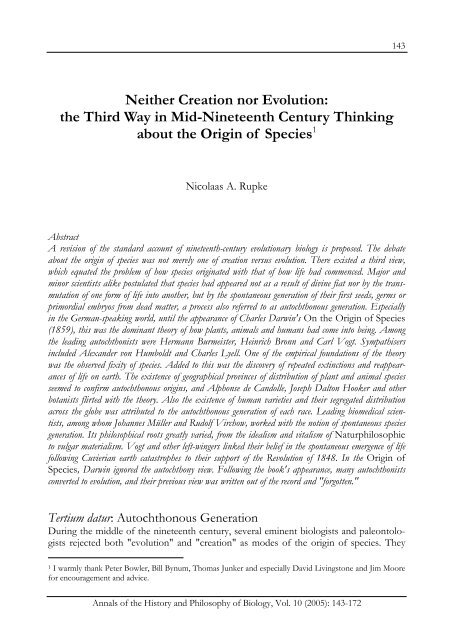Annals of the History and Philosophy of Biology
Annals of the History and Philosophy of Biology
Annals of the History and Philosophy of Biology
Create successful ePaper yourself
Turn your PDF publications into a flip-book with our unique Google optimized e-Paper software.
Nei<strong>the</strong>r Creation nor Evolution:<br />
<strong>the</strong> Third Way in Mid-Nineteenth Century Thinking<br />
about <strong>the</strong> Origin <strong>of</strong> Species 1<br />
Nicolaas A. Rupke<br />
Abstract<br />
A revision <strong>of</strong> <strong>the</strong> st<strong>and</strong>ard account <strong>of</strong> nineteenth-century evolutionary biology is proposed. The debate<br />
about <strong>the</strong> origin <strong>of</strong> species was not merely one <strong>of</strong> creation versus evolution. There existed a third view,<br />
which equated <strong>the</strong> problem <strong>of</strong> how species originated with that <strong>of</strong> how life had commenced. Major <strong>and</strong><br />
minor scientists alike postulated that species had appeared not as a result <strong>of</strong> divine fiat nor by <strong>the</strong> transmutation<br />
<strong>of</strong> one form <strong>of</strong> life into ano<strong>the</strong>r, but by <strong>the</strong> spontaneous generation <strong>of</strong> <strong>the</strong>ir first seeds, germs or<br />
primordial embryos from dead matter, a process also referred to as autochthonous generation. Especially<br />
in <strong>the</strong> German-speaking world, until <strong>the</strong> appearance <strong>of</strong> Charles Darwin's On <strong>the</strong> Origin <strong>of</strong> Species<br />
(1859), this was <strong>the</strong> dominant <strong>the</strong>ory <strong>of</strong> how plants, animals <strong>and</strong> humans had come into being. Among<br />
<strong>the</strong> leading autochthonists were Hermann Burmeister, Heinrich Bronn <strong>and</strong> Carl Vogt. Sympathisers<br />
included Alex<strong>and</strong>er von Humboldt <strong>and</strong> Charles Lyell. One <strong>of</strong> <strong>the</strong> empirical foundations <strong>of</strong> <strong>the</strong> <strong>the</strong>ory<br />
was <strong>the</strong> observed fixity <strong>of</strong> species. Added to this was <strong>the</strong> discovery <strong>of</strong> repeated extinctions <strong>and</strong> reappearances<br />
<strong>of</strong> life on earth. The existence <strong>of</strong> geographical provinces <strong>of</strong> distribution <strong>of</strong> plant <strong>and</strong> animal species<br />
seemed to confirm autochthonous origins, <strong>and</strong> Alphonse de C<strong>and</strong>olle, Joseph Dalton Hooker <strong>and</strong> o<strong>the</strong>r<br />
botanists flirted with <strong>the</strong> <strong>the</strong>ory. Also <strong>the</strong> existence <strong>of</strong> human varieties <strong>and</strong> <strong>the</strong>ir segregated distribution<br />
across <strong>the</strong> globe was attributed to <strong>the</strong> autochthonous generation <strong>of</strong> each race. Leading biomedical scientists,<br />
among whom Johannes Müller <strong>and</strong> Rudolf Virchow, worked with <strong>the</strong> notion <strong>of</strong> spontaneous species<br />
generation. Its philosophical roots greatly varied, from <strong>the</strong> idealism <strong>and</strong> vitalism <strong>of</strong> Naturphilosophie<br />
to vulgar materialism. Vogt <strong>and</strong> o<strong>the</strong>r left-wingers linked <strong>the</strong>ir belief in <strong>the</strong> spontaneous emergence <strong>of</strong> life<br />
following Cuvierian earth catastrophes to <strong>the</strong>ir support <strong>of</strong> <strong>the</strong> Revolution <strong>of</strong> 1848. In <strong>the</strong> Origin <strong>of</strong><br />
Species, Darwin ignored <strong>the</strong> autochthony view. Following <strong>the</strong> book's appearance, many autochthonists<br />
converted to evolution, <strong>and</strong> <strong>the</strong>ir previous view was written out <strong>of</strong> <strong>the</strong> record <strong>and</strong> "forgotten."<br />
Tertium datur: Autochthonous Generation<br />
During <strong>the</strong> middle <strong>of</strong> <strong>the</strong> nineteenth century, several eminent biologists <strong>and</strong> paleontologists<br />
rejected both "evolution" <strong>and</strong> "creation" as modes <strong>of</strong> <strong>the</strong> origin <strong>of</strong> species. They<br />
1 I warmly thank Peter Bowler, Bill Bynum, Thomas Junker <strong>and</strong> especially David Livingstone <strong>and</strong> Jim Moore<br />
for encouragement <strong>and</strong> advice.<br />
<strong>Annals</strong> <strong>of</strong> <strong>the</strong> <strong>History</strong> <strong>and</strong> <strong>Philosophy</strong> <strong>of</strong> <strong>Biology</strong>, Vol. 10 (2005): 143-172<br />
143

















